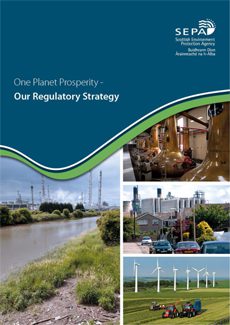
On 8 August SEPA published a new strategy document, titled One Planet Prosperity – Our Regulatory Strategy, which sets forth changes in the way it plans to regulate and encourage businesses to improve their environmental performance, including ways of helping them go beyond mere compliance.
The new approach seemingly enacts a shift from a “20th century” model of environmental protection agency, where the emphasis was on reducing gross industrial pollution, to what it believes is the remit of a 21st century EPA, with an increasingly important role in addressing more diffuse sources of pollution, over-use of natural resources and challenges such as climate change.
Furthermore, says the document, EPAs “will need to do all this work in ways that contribute to the social and economic success of the societies they serve”.
Terry A’Hearn, SEPA’s Chief Executive said: “Under this strategy, SEPA will make two key contributions to making Scotland stronger. First, we will more quickly and powerfully get all Scottish businesses meeting the environmental laws in Scotland. Second, we will help as many Scottish businesses as possible go even further, helping them find profitable ways to go beyond what the law requires in reducing their use of energy, water and materials and the amount of waste they produce.
“By identifying where individual businesses and industry can go beyond compliance, Scotland has the unique opportunity to set the trend on a global scale. There are huge economic incentives for going beyond basic compliance. Especially as pressure on our current resources becomes greater, it will ultimately be businesses that are more sustainable that will continue to thrive, helping to create more lasting and inclusive growth in Scotland.”
Drawing upon the new powers granted by the Regulatory Reform (Scotland) Act in 2014, SEPA says it will look to develop a range of regulatory tools through which to deliver the new strategy, including a streamlined charging scheme, a suite of new enforcement powers and development of Sustainable Growth Agreements with industry leaders.
Environment Secretary Roseanna Cunningham said the new environmental regulation programme, which is under development, “aims to maximise environmental protection while ensuring proportionate and consistent regulation and effective enforcement”.
SEPA pledges to continue to focus on waste crime through initiatives such as partnership working with other enforcement agencies, tackling things like organised crime.
And the new enforcement policy will seemingly take a more proportionate and effective approach. SEPA will also start to phase in the practical use of new fixed and variable monetary penalties and enforcement undertakings.
The document itself can be viewed here.
Industry response: Call to avoid unnecessary criminalisation
Recycling Association chief executive Simon Ellin welcomed the new document, and the reference to partnership work with other agencies to disrupt organised crime, saying his membership “will always support ways to crack down on illegal operators”.
But he said the Recycling Association would also like to see SEPA work with the other UK environment agencies “to ensure a consistent approach when it comes to export”. He said it remains the case that guidance on the amount of out-throw allowed on exports is unclear, but “legitimate exporters can still face prosecution and huge legal bills from the environment agencies on this guidance”.
“It is important that we distinguish between serious organised waste crime and less significant and inadvertent breaches of waste shipment regulations. Increasingly, our members are finding themselves facing prosecutions for breaches of very unspecific rules. For example, what is the maximum permitted out-throw in a cargo of paper for recycling? Is it zero percent? Is it 1.5 percent? We simply don’t know, so how can we face prosecution if we don’t know the rules? This is where the UK enforcement agencies must work together with The Recycling Association and our members to help us understand our statutory obligations. We are a long established industry that is a credit to the UK. We should not be labelled as criminals.
“If the UK agencies were prepared to accept the EN643 standard for paper, and the Chinese maximum of 1.5% out throw, then this is something that The Recycling Association members could work with. So we call on SEPA to take the ‘proportionate and effective approach’ it has suggested on enforcement, and work with the other UK environment agencies to implement these standards.
“We also await the detail on the new fixed and variable monetary penalties to understand if this might impact on our members.”







